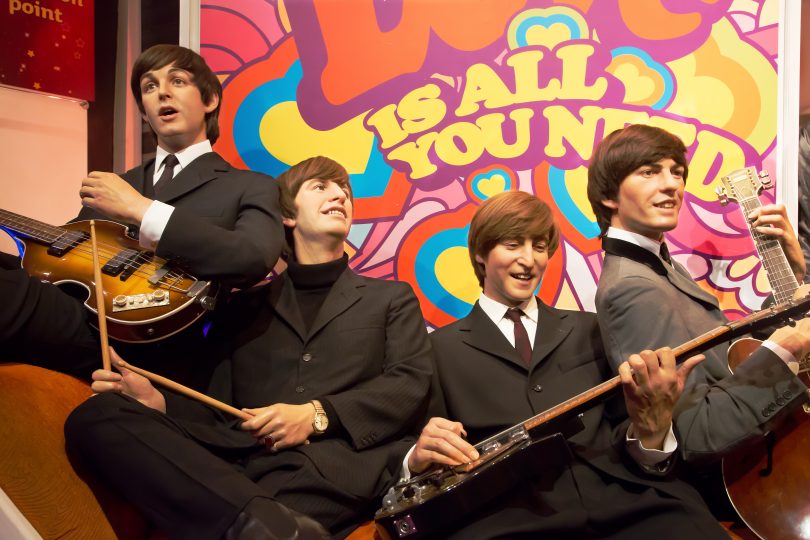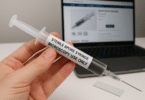“LSD was the self-knowledge which pointed the way” – John Lennon.
John Lennon, Paul McCartney, George Harrison and Ringo Star all made up the 1960s band: The Beatles. Described as the most critically acclaimed and commercially successful pop music band in history, these four guys from Liverpool changed the music scene forever. They released 21 studio albums, 63 singles and won four major awards. However, what started off as 4 talented and well-mannered boys from the UK, soon became something else as they began experimenting with the world of psychedelics. The Beatles became disillusioned by fame and were a band that searched for more, with hallucinogens. But how did this affect their music, image and future?
Artists, celebrities, and eclectic types have been using psychedelics to enhance their art forms for decades. The counterculture of the 1960s was especially known for this type of progressiveness. For more articles like this one, as well as exclusive deals on flowers, vapes, edibles, and other legal products, make sure to subscribe to The THC Weekly Newsletter. We’ve got great deals for delta-8 THC along with delta-9 THC, THCV, THCP, delta 10, HHC & THC-O, so go ahead, and check out our always-updated selections.
The Beatles
The Beatles started out as 4, average, boys from Liverpool. The name of the band came from the teenagers combining the words ‘beetles’ and ‘beat’, which may have sounded ridiculous at the time but now can be looked back on as pure genius. The one thing that was never in doubt about these boys was their talent. A recent documentary, ‘Get Back’, made by Peter Jackson, shows the band rehearsing a gig in 1970. The sheer musical talent and improvisation abilities is spellbinding. Anyway, after doing the rounds of smaller gigs in the 50s, the band made a name for themselves through doing shows in Hamburg. It was then in 1962 that they signed their first musical contract with Brian Epstein’s outfit and the rest is beautiful history. It’s important to note that the Beatles adapted their sound in each of their albums, and yet consistently kept their same innate charm. Their music will be played and covered for generations to come.
What are Hallucinogens?
It was in 1965 that the Beatles first came into contact with LSD, but first it’s perhaps important to understand what psychedelics are. Drugs are commonly split into four categories.
- Depressants – including alcohol and GHB.
- Stimulants – including cocaine and meth.
- Opioids – including heroin and oxycontin.
- Hallucinogens – including LSD, PCP and DMT.
There are overlaps with these drugs, and some would argue that cannabis – for example – fits into all 4. However, when it comes to hallucinogens, there’s something rather particular about them. To put it simply:
“Hallucinogens are a diverse group of drugs that alter a person’s awareness of their surroundings as well as their own thoughts and feelings.”
Hallucinogens, like LSD, are known for their world altering effects and hallucinations. It’s a hard experience to describe unless you’ve tried it yourself. Words on a page don’t come close to capturing the true nature of a hallucinogenic drug, or any drug for that matter. All that can be said is that LSD can open up your mind, and show you your subconscious. Show you a different reality to the one you know.
LSD
An LSD trip can last anywhere from 6-12 hours. You can see images, colours and even people that aren’t really there. It can trigger feelings of euphoria, deep thought and sometimes depression if you’re already in a bad mental state. The way that LSD reacts on the brain and causes trips are still, to an extent, unknown. Nonetheless, the effects of LSD have been utilised by people in the arts for generations and will be used for generations to come.
The Beatles & LSD
Any famous musician, especially to the standard of the Beatles, has to be referred to as a genius. In other words, the extraordinary nature and talent of the Beatles leads us to believe that their minds worked differently to the average person. Michael Jackon, the Beatles, Elvis, Dylan – all of these incredible artists are rare and, as such, were most likely wired differently in one way or another. In a sense, it’s no surprise that the Beatles turned to LSD. They’d already imagined a world for themselves so unimaginable when they were young aspiring musicians, that an LSD trip was probably nothing out of the ordinary for them. Plus, with the search to constantly evolve as a band and think of new, fresh and innovative sounds, LSD was a chance for them to write revolutionary music. It’s without a doubt that some of the Beatles music was definitely inspired by their experiences with hallucinogens. John Lennon said:
“I was suddenly struck by great visions when I first took acid. But you’ve got to be looking for it before you can possibly find it. Perhaps I was looking without realising it. Perhaps I would have found it anyway. It would have just taken longer”
This is a great example of the beautiful unity of talent and acid. It shows here that Lennon was searching for something and found acid to be an assistance. However, that’s not to say that acid creates talent, it simply helps people to see in a different way.
But when did it all start for the Beatles and acid?
The Dental Experience of 1965
In 1965, the Beatles were a well-acclaimed band and had a thriving career. However, something was about to happen that would change their music forever. It began, oddly, in their dentist’s house. Riley (the dentist) invited John Lennon and George McCartney to his house for a small gathering, which then became their first acid experience.
“On the mantelpiece six sugar cubes had been carefully lined up. The cubes, each of which contained a dose of LSD, were slipped into the guests’ coffees.”
After that experience, George and John spoke about feeling closer than they ever had. It’s thought to have brought them together; like brothers. George and John’s relationship is what made the Beatles what they were. Perhaps some of that is to do with the closeness they felt after intimate drug experiences. George Harrison wrote this about the trip:
“It was something like a very concentrated version of the best feeling I’d ever had in my whole life.”
After this, the Beatles opened up their minds to the world of hallucinogens and started letting it inspire and affect their music – including the albums Revolver and Sgt. Pepper.
The Beatles Changed Their Image
The Beatles were turning from British respectable lads, to drug experimentalists. They were changing their world-wide image.
“The frequent trips gave the Fab Four a new sense of mindfulness and freedom, one that not only poured itself into their music but also made them more honest with the press in the process”
When asked if he felt he had a responsibility to be anti-drugs due to his power and fame, John Lennon famously said to Hunter Davies in 1967:
“I never felt any responsibility, being a so-called idol… It’s wrong of people to expect it. What they are doing is putting their responsibilities on us… If they were worried about him being responsible, they should have been responsible enough and not printed it, if they were genuinely worried about people copying”
Interviews were only the peak of the iceberg, the real evidence of the Beatles love for acid was coming through their music. Throughout the whole of the Revolver and Sgt. Pepper albums are countless references to acid and psychedelia. In fact, in the song ‘Tomorrow Never Knows’, the lyrics written include quotes from Richard Alpert’s cult-favourite book The Psychedelic Experience.
Their Trip to India of 1968
In 1967, the Beatles ended their consistent relationship with LSD. Instead, they decided to spend time finding an alternative high or trip. However, this one they found from natural causes. This all came with their trip to India and new-found love for Maharishi Mahesh Yogi’s system of Transcendental Meditation. Whilst out there they experienced new, natural trips all triggered by deep breathing and meditation. In fact, this trip potentially had the same or even more effect on their music than acid had done. During their 2-3 month stay they wrote 48 songs and the majority of the White Album.
John said: “I was in a room for five days meditating…I wrote hundreds of songs. I couldn’t sleep and I was hallucinating like crazy, having dreams where you could smell. I’d do a few hours and they you’d trip off, three- or four-hour stretches. It was just a way of getting there, and you could go on amazing trips.”
George said: “The meditation buzz is incredible… I get higher than I ever did with drugs. It’s simple … and it’s my way of connecting with God.”
It’s as if LSD had worn off the Beatles and they were now searching for something more, something natural, something real. Even LSD wasn’t enough for the Beatles, who were constantly searching for more, and searching for a new way to experience the world.
Conclusion
The Beatles were one of the best bands to ever live and their music was both revolutionary and beautifully simple at the same time. They weren’t afraid to evolve and adapt, letting the world affect their sound. It was this that let hallucinogens into their lives, and that could be responsible for some of their best ever music. However, as Harrison himself said, acid does not create talent, it simply helps you find the way.
Hello and welcome! Thanks for stopping by CBDtesters.co, your #1 web source for cannabis and psychedelics-related news, offering the most interesting stories of today. Join us frequently to stay on-top of the quickly-moving world of legal drugs and industrial hemp, and remember to check out The THC Weekly Newsletter, to ensure you’re never late on getting a story.
Disclaimer: Hi, I’m a researcher and writer. I’m not a doctor, lawyer, or businessperson. All information in my articles is sourced and referenced, and all opinions stated are mine. I am not giving anyone advise, and though I am more than happy to discuss topics, should someone have a further question or concern, they should seek guidance from a relevant professional.







